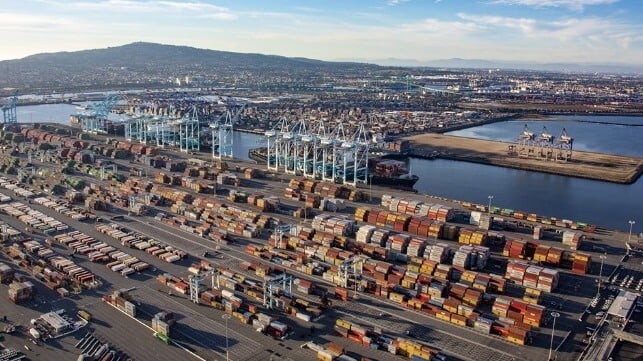Trump's Tariff Plans Set Businesses and Leaders Into Action

When President-elect Donald Trump announced detailed plans to impose tariffs on goods from Canada, Mexico and China, the news was expected, as he had threatened steep tariffs on imports throughout his campaign. However, the sudden reality of specific numbers - 25 percent duties for Mexican and Canadian goods, and an extra 10 percent for Chinese goods - has set importers, investors and foreign officials into action.
The private sector's adaptation measures have been under way for months. American retailers and manufacturers who need foreign goods began front-loading their import shipments in advance of the election, driving record-setting cargo volumes at the Ports of Los Angeles and Long Beach. But that process is speeding up: according to Nikkei, three of the biggest names in American tech - Microsoft, Dell and HP - are pushing their Chinese suppliers to speed up component shipments to arrive before Trump enters the White House on January 20.
Each of the affected trade partners have different interests, but all are intimately linked with the U.S. economy. Canada exports more to the U.S. than to the rest of the world combined, and both NAFTA members are intertwined with American industries, particularly auto manufacturing. Moody's Analytics predicted that the Mexican economy would be affected most by Trump's trade policies, and the ratings firm cut its GDP growth forecast for Mexico from 2.5 percent down to 1.6 percent for 2026.
For China, the U.S. is by far the most important export market, absorbing $550 billion in Chinese-made goods every year.
The newly-announced 10 percent rate hike for Chinese goods will increase costs for imports, but it is far more modest than the 60 percent-plus tariff that Trump campaigned on. Beijing's response to the news was uncharacteristically muted.
"We will respond to that later," said Chinese foreign ministry spokeswoman Mao Ning on Tuesday. "Let me say more broadly that we are open to dialogue and communication."
Mexico's president objected strongly to the news, and suggested that countervailing tariffs were likely. "To one tariff will follow another in response and so on, until we put our common businesses at risk," Mexican President Claudia Sheinbaum said Tuesday.

that matters most
Get the latest maritime news delivered to your inbox daily.
But many see the tariff threat as an opening gambit for negotiations on non-trade issues, like border security and the narcotics trade - both of which were mentioned in Monday's announcement.
"We believe Trump's announcement is a tactic to negotiate with these three countries, his main trade partners, from a position of strength, taking into account that imposing tariffs would also be negative for the U.S. economy," wrote Mexican commercial bank CIBanco in a research note. "As such the final result of the tariff threat could be less severe once negotiations with the respective parties conclude."
